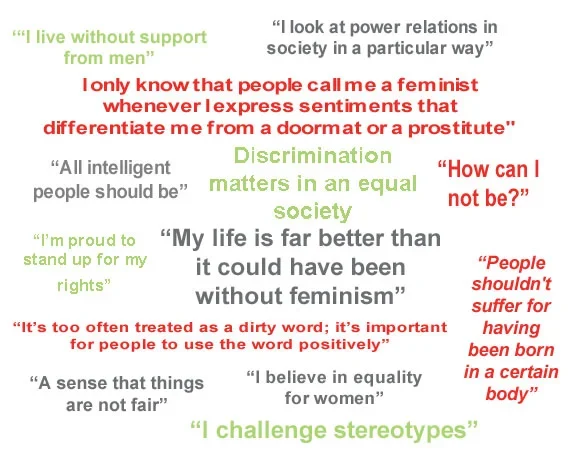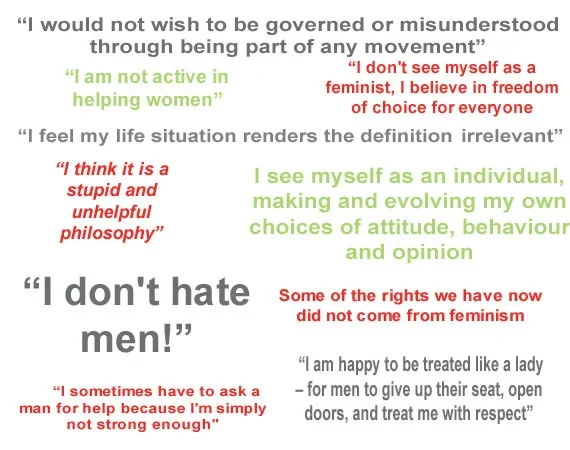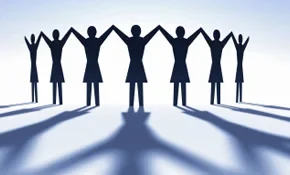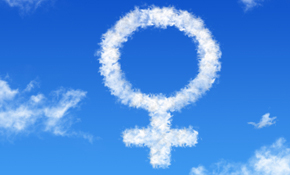In the run up to International Women's Day we asked PoliticsLab participants to share their thoughts on the concept of feminism - what it means to them, as a term and as a movement; whether or not they feel feminism is as important today as it has ever been; and to tell us, why they as individuals consider themselves for or against the idea.
Putting the following question to participants, as you might imagine, invited answers that were far from uniform or simple...
So what does ‘feminism’ mean to you?
We received the full spectrum of responses. From those who spoke passionately of feminism as an historical movement, steeped in the work of key writers and activists, and whose work is far from over - to its challengers, who defined feminism as misplaced anger or militant activism, and the protection of womens' interests against men's.
Below we look at answers from participants engaging in PoliticsLab.

What does feminism mean to you? Do you call yourself a feminist, or prefer another term? Should we continue to stand up for feminist causes? Add your voice to the debate in Disqus below
Why I’m a feminist:

Why I’m NOT a feminist:

2. What does the word 'feminism' mean to you?
We then asked people participating in PoliticsLab to give their own definition of what feminism is to them. Here's how feminists and non- or anti-feminists explained the concept:
To FEMINISTS, feminism is...
 Actively promoting the rights of women – “Choice for women, equal rights, respect, equal pay, an end to sexism, an end to domestic and sexual violence, higher rape convictions”
Actively promoting the rights of women – “Choice for women, equal rights, respect, equal pay, an end to sexism, an end to domestic and sexual violence, higher rape convictions”- That men and women should be treated equally in society – “Access to work, education, medical care, political activity and anything else you want to list is not to be determined by sex, gender or gender preference … Base the job on the skill required, not the sex of the person applying”
- Fighting for the rights of the individual, regardless of their gender – “A fight for equal rights and status for people regardless of their gender”
- Female independence and empowerment – “Feminism means that women's intuition is given recognition, and can therefore provide a balance in decision making. Female power is different to male power, and women developing and using that power is for the good of society”
- Awareness - "Recognition that the world is structured along gender lines and that women are an oppressed group, while acknowledging that differences occur when ethnicity, ability, age, sexual orientation, class and other characteristics are concerned”
- Against the objectification and exploitation of women, and the male-dominated world or ‘patriarchy’ – “Challenging sexist culture including objectification of women and harmful body images. Defending the right of women to have control over their own bodies”
- Challenging fixed ideas about what women (and men) should be and do –“Hetero-normative gender stereotypes hurt everyone”
- Giving women control over their own bodies – “Protection for women against objectification and judgement of their abilities by female/mother status. Recognition of the mother role as a valuable contribution to society, not a career break. Reproductive rights for women; legal access to abortion; pro-choice for birthing; promotion of empowerment and protection from unnecessary intervention in birthing”
- Recognition that there are still glass ceilings to break – “Even in modern Western democratic states we don't have gender equality. Women earn less, social hierarchies expect women to take subordinate roles, and violence and discrimination against women isn't taken as seriously as it would be about men. This is bad for everyone – women and men both suffer from this impoverished understanding of human beings and social roles that restrict the realistic options of all of us. Hence, I am a feminist”
- A movement which takes many forms… – “A multi-stranded set of movements and theories with many aims but sharing an overarching aim to end sexist oppression”
- …but that sometimes is an unhelpful term – “I accept the term feminist but prefer ‘equalist’. Feminism is about ensuring that there are equal rights and opportunities for women and men. What annoys me is when feminism is abused to say that women are superior or that men are inferior. This defeats the whole message behind feminism”
To NON-FEMINISTS, feminism is...
- A movement which promotes women’s rights, but neglects men – “A divisive movement which seeks to promote the interests of women and oppose the interests of men”

- Strident activism –“"A divisive movement which seeks to promote the interests of women and oppose the interests of men."I associate feminism with militant feminism, but I do know that it simply means 'belief in gender equality'. I do not like the term feminism as I associate it with more militant activism, but I do believe in its principles”
- Questioning women’s value in society – “I think it implies that women are not valued in society, and sets out in an aggressive way to rectify this. Whereas I feel that women are equal to men in a different way; retaining their femininity”
- Not the best way of achieving equal rights – “I believe women should have equal rights but these could have been achieved by gathering support. Some of the rights we now have were not achieved through feminists burning bras. They were achieved by reasonable people in positions of power, who saw the unfairness of things such as women being paid about half a man's wage”
- Anger towards men – “Unfortunately the word feminism has become outmoded, and my image is of women who dislike men and can only see them as some kind of challenge or impediment. We should celebrate our differences and make the most of them!”
- No longer relevant –“Feminism is an outmoded principal that was important 30-40 years ago, in the fight for equality of the sexes, but is now redundant”
- An excuse for women to go against their ‘true nature’ – “Drunken behaviour; lack of nurturing; male employment roles; career women – these are all by products of women who battle senselessly against their true nature because they have been led to believe that they can have it all”
- Positive discrimination – “It means pro-woman sexism. It used to mean equality, however now it is just an aggressive form of discrimination”
- ‘Political correctness gone mad’ – “Feminism was once the noble cause of female empowerment and the support of women's rights. Now it is a PC war-machine”
- A movement fixated on gender – “I believe in a gender-blind society; I find the label feminism unhelpful to describe my views in practical terms, but also because it frames the debate in terms of women when it should be framed in terms of gender”
- Denial that biological differences do influence the roles of men and women – “I am an academic zoologist and much of what passes as feminism flies in the face of nature! Nothing against equal pay or freedom to take out mortgages, etc. but it is the females who have the babies, and are equipped to feed them in infancy, and this has associated biological responsibilities and restraints that males don't have. That doesn't mean we don't change nappies, etc., but it just is an irrefutable biological barrier to true equality. The baby spends nine months becoming biologically and chemically bonded to its mother and no amount of politically correct legislation can alter that”
3. How important is feminism?
International Women's Day, held annually on the 8th of March, shines a light on the accomplishments and objectives of feminism, as it celebrates the emancipation of women over the centuries and highlights key areas in which women are still not acknowledged as equals.
Thinking of feminism’s story in the West, you might hold the view – as a number of our participants did – that there is no longer any real ‘cause’ for feminism. While many visibly appreciate the fruit of the feminist movement, they just don’t feel they have anything left to struggle against. That said, stories of sexism, speculation around gender inequality, and feminist protests, recurrently make the headlines.

So do you think feminism is still a driving force in today's society? Here's what our feminism poll participants had to say on the matter:
Feminism is still very important
“Around the world women face the risks of poverty, sexual slavery and assault, lack of access to abortion and contraception, female genital mutilation, health problems in pregnancy, childbirth and nursing and lack of education. Even developed countries have issues, such as: the pay gap, domestic violence, high sexual assault rates with low conviction rates, homophobia, transphobia and objectification” Anon, UK
“Because at the moment, women are still paid less in work than men” Kat, Bristol

“Because if women don't stand up for their rights, there will always be men who will take advantage of them” Anon
“Women make up over 50% of the world's population and yet are inadequately represented in almost every walk of life. Some advances have been made in the Western world to rectify this, but people have got complacent and things have started to slide backwards again (e.g. the government cuts which will affect women far more than men). In many parts of the world no changes have taken place at all and nobody does anything. Women in Saudi have fewer rights than black people did under Apartheid, but there are no trade embargoes etc. happening there.” Ruth S, London
“Women are still treated as second class citizens in far too many parts of life” Ian, Birmingham
“Women's rights are also men's rights and children's rights. Gender prejudice helps no one, and attitudes and structures should reflect modern society. Having more women in positions of power could help to change the way business and politics works” Lianne, Brighton
There is no longer a cause for feminism
 “Women are already treated equally and in most cases better than men because people and employers are terrified of being branded as 'sexist'. This is now an abuse of the rights and the original feminist movement” Anon, UK
“Women are already treated equally and in most cases better than men because people and employers are terrified of being branded as 'sexist'. This is now an abuse of the rights and the original feminist movement” Anon, UK
“Equality under the name of feminism is selective. In Western countries it translates as a woman’s right to do whatever, whenever, and with whomever she chooses, without thought to anyone other than herself. In less developed countries, it is still of some importance, although I think on a more human level rather than a gender one. The access to basic needs and desires should be available to any human regardless. Feminism has made this issue cloudy I feel” Anon, UK
“The gender difference debate hangs on a false dichotomy. Power and wealth are the important social divides, not gender” David, Norfolk
“Theworld was a better place when women were the bedrock of the home”Anon, UK
“We are now the same as men and are treated as such. Before, we were respected as mothers and protected. Now we have to stand alone”Petra, Buckinghamshire
“Now I believe men are in need of a bit of equality. Where is the equality in custody of children etc.?”Anon, UK








